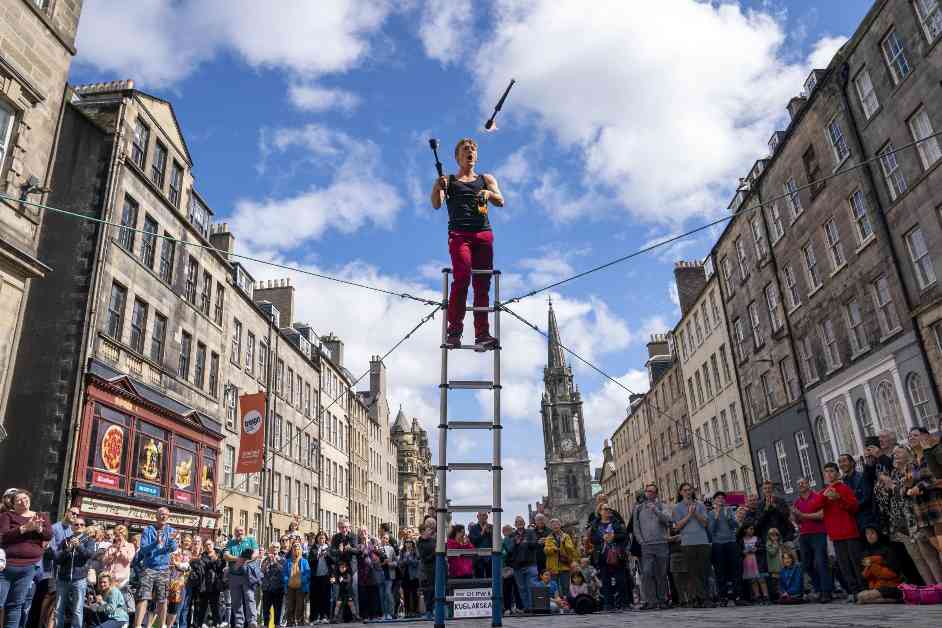The Edinburgh Festivals Face Uncertain Future Amid Arts Education Cuts: Fringe Chief’s Stark Warning
As the curtains close on another successful Edinburgh Festival Fringe, concerns about the future of the arts sector loom large. In an open letter penned by Shona McCarthy, the chief executive of the Edinburgh Festival Fringe Society, a dire warning was issued regarding the potential risks facing the Edinburgh Festivals if the UK continues down the path of cuts to arts education.
Rising Costs and Funding Cuts
McCarthy highlighted a myriad of issues impacting artists, including the rising cost of living, accommodation challenges, funding cuts, and more. These factors collectively hinder artists’ ability to produce work and showcase their talents on the global stage. Despite the festival’s apparent success this year, with 2.6 million tickets issued and thousands of shows across various venues in the city, McCarthy emphasized that this success should not overshadow the underlying struggles faced by artists in the UK.
The Heart of the Issue: Artists and Funding
At the core of McCarthy’s message lies a simple yet profound statement – “there is no Fringe without art. There is no art without artists.” This sentiment underscores the crucial role that artists play in the vibrancy and diversity of the Edinburgh Festivals. McCarthy expressed deep concern about the current state of affairs for artists in the UK and stressed the importance of adequate funding to sustain this annual celebration of creativity, innovation, and cultural exchange.
Policy Environment and Complacency
McCarthy took aim at policymakers, cautioning against complacency in the face of the festival’s success. She highlighted the challenges posed by the relentless rise in the cost of living, unhelpful policy changes affecting the arts sector, and ongoing public sector cuts. These factors collectively contribute to a climate of uncertainty and anxiety among artists, jeopardizing the future of the Edinburgh Festivals as a beacon of artistic excellence and cultural diversity.
Navigating Uncertain Waters: The Fringe’s Role in the Arts Landscape
As the arts landscape in the UK stands at a crossroads, McCarthy underscored the critical role of the Edinburgh Festival Fringe in nurturing artistic risk-taking, ambition, and creativity. She emphasized the need to safeguard the festival’s unique position as a global platform for emerging artists, where experimentation and innovation thrive. McCarthy called for a concerted effort to support artists and venues that form the backbone of the festival, ensuring that the Fringe remains a vibrant and inclusive space for artistic expression and cultural exchange.
Challenges and Opportunities: A Call to Action
The recent funding announcements in Scotland have sent shockwaves through the arts sector, prompting calls for urgent action to protect the future of the Edinburgh Festivals. Dani Rae, the managing director of the Fringe Society, highlighted the far-reaching impact of these funding cuts on the entire arts ecosystem. She emphasized the importance of recognizing the invaluable contributions of artists to the cultural landscape and called on the Scottish and UK governments to prioritize the arts sector’s sustainability and resilience.
Celebrating Diversity and Inclusivity: The Impact of the Festivals
The Edinburgh Festivals have long been celebrated for their diversity, inclusivity, and global reach. This year’s edition saw 3,746 shows registered at the Fringe, with artists from 60 countries sharing their talents on stage. The festival attracted over 900 accredited media outlets from 27 countries, underscoring its international significance as a platform for artistic exchange and dialogue. Additionally, efforts were made to enhance accessibility for all, with 60% of shows being accessible for wheelchair users and over 300 sensory resources used to support autistic attendees.
Community Engagement and Support: A Vital Connection
The Fringe’s impact extends beyond the confines of its venues, reaching out to local schools, charities, and community groups through initiatives like the Fringe Days Out scheme. This program offers free vouchers and transportation to individuals who may not typically have access to the festival, fostering greater community engagement and participation. Such initiatives underscore the festival’s commitment to inclusivity, diversity, and social cohesion, making it a truly unique and transformative event for all involved.
Looking Ahead: Navigating Uncertainty and Embracing Change
As the Edinburgh Arts Festival also draws to a close, the spotlight remains on the challenges and opportunities facing the arts sector in Scotland. With a record number of attendees and participating artists, the festival reported a successful year marred by funding concerns. Kim McAleese, the festival director, emphasized the importance of supporting artists in the face of daunting funding cuts, highlighting the need for sustained investment in the arts to ensure their continued vibrancy and relevance.
Government Response and Commitment to the Arts
In response to the funding challenges facing the arts sector, the Scottish Government reiterated its commitment to supporting the arts and culture industry. Despite facing financial constraints, the government pledged to work closely with the sector to address its pressing needs and challenges. The Culture Secretary’s engagement with stakeholders reflects a proactive approach to safeguarding Scotland’s world-class arts and culture sector, underscoring the government’s dedication to nurturing creativity, innovation, and cultural exchange.
In Conclusion
The future of the Edinburgh Festivals hangs in the balance as the arts sector grapples with funding cuts, policy challenges, and rising costs. Artists, venues, and arts organizations are calling for urgent action to protect the vibrancy and diversity of the festivals and ensure their continued success. As we reflect on the transformative power of the arts and the invaluable contributions of artists to our cultural landscape, it is imperative that we rally together to support and sustain the Edinburgh Festivals for generations to come. There is no art without artists, and there are no Edinburgh Festivals without artists – let us stand united in safeguarding the future of our cultural heritage and artistic legacy.
































